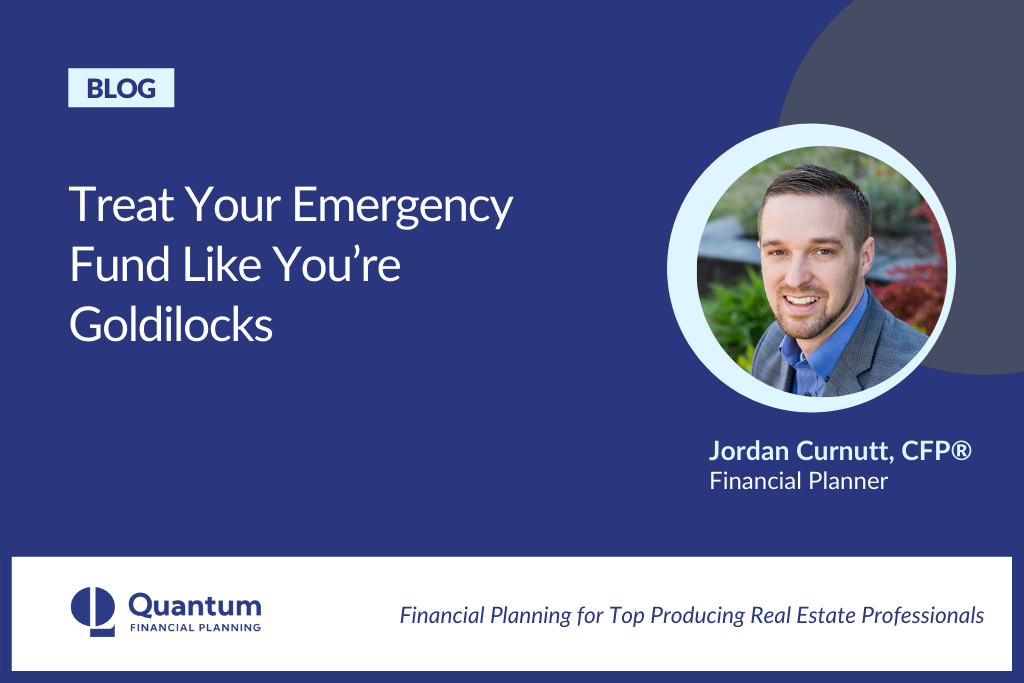It is more important than ever to find your “just right” emergency fund.
Let’s take a look at what you need to be aware of and how you can optimize your emergency fund to a balance that is “just right” for you and your family.
A Lukewarm Emergency Fund
Having too little stashed away in a safe account for when life happens and an emergency comes your way is a mistake you desperately want to avoid.
The traditional rule of thumb for emergency funds is to have three to six months of living expenses set aside in cash.
Given the cyclical nature of the real estate market, we typically encourage real estate agents to skew toward the higher end of this spectrum, with some scenarios even exceeding this amount.
Keep in mind one of the keywords in the definition of an emergency fund is cash.
While there is certainly limited growth potential in cash, that is the opportunity cost we will gladly pay in exchange for the peace of mind that the full amount is standing ready when we need it most.
And be sure to avoid the temptation of fooling yourself into believing a stock account or real estate investment can act as your emergency fund.
While both of these investments can be lucrative in the long run, they lack the short-term stability and liquidity required to qualify as your emergency fund.
A Piping-Hot Emergency Fund
The second bowl of porridge we want to steer clear of is the overallocated emergency fund.
This is especially important during periods of high inflation (which we just so happen to be in).
As of this writing, inflation sits at the highest level we have seen since the 1980s, roughly 7.9% per year.
So why is high inflation so problematic for your overallocated emergency fund?
Consider the following situation: Let’s imagine you had $200,000 sitting in your checking account in April of 2021, and for the next 12 months you didn’t spend any of it.
How much do you have today?
Answer: Although you still have your full $200,000, you retained only $184,200 of purchasing power.
That’s a $15,800 loss!
While an overallocated emergency fund leaves you fully prepared for short-term emergencies, it can be severely detrimental to your long-term financial success.
In fact, this is the #1 struggle I see with top-producing agents as it pertains to their emergency fund.
A Just-Right Emergency Fund
At last, what you have been waiting for, the “just right” emergency fund!
But first, a caveat.
Your personal financial situation will dictate where you need to land between the extremes of “lukewarm” and “piping hot.”
With that said, here are some guiding principles to get you thinking in the right direction for you and your family.
- Emergency funds need to be cash assets. Period.
- Just because it’s cash, doesn’t mean it can’t appreciate! Be sure to consider how a high-yield savings account can factor into your emergency fund mix.
- Three to six months of living expenses is a good place to start. From there, you can begin to factor in the circumstances at play for your specific situation. Aiming for the high end of that spectrum is typically prudent for Realtors®.
- Set a target and adjust. Once your target emergency fund has been established, this is your guidepost for how you deploy the rest of your commission income, which translates into how you build out the rest of your net worth.
- Don’t be afraid to move past cash savings and invest for the future. Time and time again, I have done financial planning with real estate agents who are sitting on a mountain of cash with no retirement savings. Make sure you have a long-term mindset!
Need help finding your “just right” emergency fund amount? Schedule a meeting with a CFP® professional to start the financial planning process.



